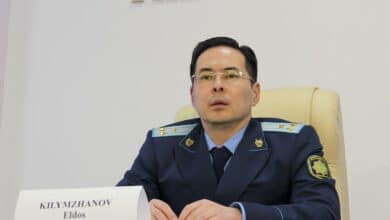Bolsonaro, rightists to take to streets for freedom, but many fear a coup

By Eduardo Davis
Brasilia, Sep 6 (EFE).- Brazilian President Jair Bolsonaro and the country’s ultraright have called on supporters to take to the streets for “freedom” on Tuesday, but many people fear that they could stage the “coup” that the most radical conservatives have been demanding that the president implement.
The pressure from those groups for a “military intervention” that “would shut down” Parliament and the Supreme Court but keep the ultrarightist leader in power has put democratic forces and the country’s economic and social sectors on alert.
Businessmen’s organizations, banks, big agricultural corporations, political parties of virtually all ideological stripes, Parliament, the judiciary and even a number of religious officials have expressed their repudiation of any attempt to subvert the democratic political order.
The fraught climate has had repercussions abroad, with the Progressive International expressing its “profound concern” over the “imminent threat” to Brazil’s democratic institutions in a document signed by key figures in 26 countries, including several ex-presidents.
Among the signers are former Spanish Prime Minister Jose Luis Rodriguez Zapatero, former Paraguayan President Fernando Lugo, Colombia’s Ernesto Samper, Panama’s Martin Torrijos and Ecuador’s Rafael Correa.
The US Embassy, meanwhile, has asked US citizens living in Brazil to stay away from areas near demonstrations since those that start out peacefully may well become violent.
The tensions have grown since last year, aggravated now by the lack of confidence sown by Bolsonaro in the electronic voting system the country adopted in 1996, which since then has not been mentioned in a single complaint of election fraud but which the president claims fosters illegal voting.
Those statements, which Bolsonaro admits he cannot prove, have coincided with the sharp decline in his approval rating to barely 25 percent and surveys forecasting former President Luiz Inacio Lula da Silva’s overwhelming triumph in the 2022 presidential election.
Amid his campaign to discredit electronic voting, Bolsonaro has said that in 2022 “there will be no elections” if a parallel system of paper ballots is not adopted, a move that has been rejected by the country’s election court and by Parliament.
Bolsonaro, who is suspected of corruption in the negotiations to purchase anti-Covid vaccines and other irregularities, is also being investigated by the Supreme Court in a case concerning the dissemination of fake news and threats to democracy that has already landed numerous ultrarightist activists in jail.
Some of those arrested have appeared on the social networks armed to the teeth and urging that during the protests on Tuesday, on Brazil’s Independence Day celebration, demonstrators “invade” Parliament and the Supreme Court and even “assassinate” judges and politicians.
Among the most extreme groups are evangelical pastors, truck drivers unions, Military Police officers and followers of the ultraconservative global movement sponsored by Steve Bannon, a former advisor to ex-US President Donald Trump.
Bolsonaro, a reserve army captain, has criticized those arrests, claiming that he does not want a “rupture” in the country’s democratic structure and saying that “everyone must base all that they do on the Constitution” and respect the right to “freedom” and to others’ “opinions.”
He has also declared, in a dramatic tone, that the current scenario provides three alternatives: “Get arrested, die or victory.”
Although he has warned that the demonstrations on Tuesday will be the “ultimatum” for those who are “attacking” the Constitution, Bolsonaro recently has lowered his tone and called for his supporters to march for “freedom,” “conservative values,” “the family, private property and God.”
The biggest demonstrations are scheduled to be held in Brasilia and Sao Paulo, where Bolsonaro has guaranteed that he will attend.
In Brasilia, hundreds of people have already camped out on the Esplanade of the Ministries, an avenue where virtually all the government buildings are located, including the seat of Parliament and the high court, but where vehicle traffic was prohibited on Monday, a ban that will only be lifted on Wednesday.
Large numbers of police have been deployed prior to the demonstrations, and in the case of Brasilia officers have also been observed along highways leading to the capital, via which caravans of Bolsonaro supporters are expected to travel to take part in the marches.
EFE





